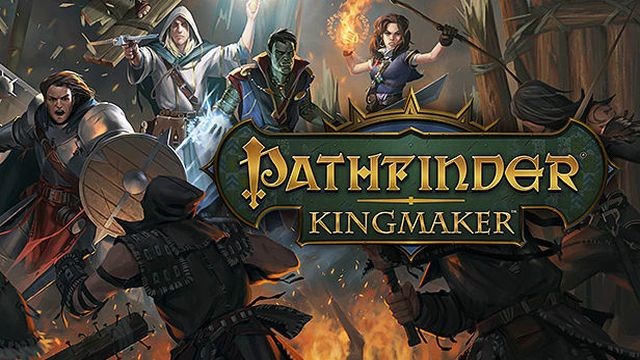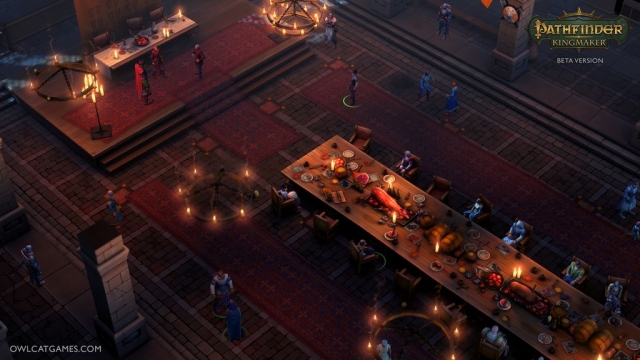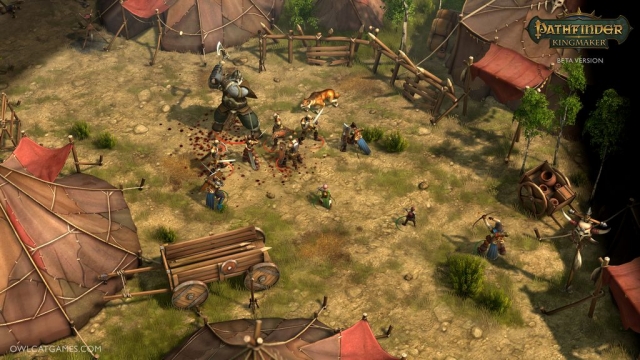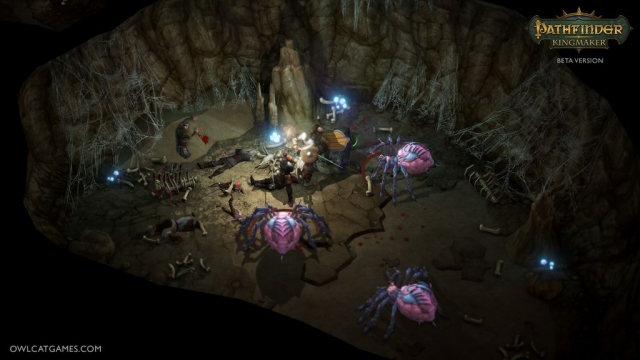Pathfinder: Kingmaker

I should probably begin by saying that, going into this review, I know absolutely nothing about the tabletop game Pathfinder upon which this game is based. It wasn’t until I looked it up that I actually realized the tabletop game existed at all. So, if there are great and insightful parallels to be drawn between the tabletop game and the videogame, the specific mechanics of the card game as they appear in the videogame, or elements of the game’s lore, region, or characters that both have in common, I’m totally not the guy to make such observations.
I should also probably add that there is a GREAT deal of tweaking going on with the game mechanics. Every time I boot up to play there is a 700MB+ patch to download, so complaints I have about this part being too hard or that piece being confusing or whatever, may well be changed with later patches. I do give the developers points for aggressively supporting their game.
All of those caveats aside, allow me to proceed with the review, m’kay?
Pathfinder: Kingmaker begins, as do all self-respecting RPGs, with character development. You can use a pre-canned character, but if you have even the slightest yen to do so, this style of RPG probably isn’t for you in the first place. P:K gives you a respectable number of options between allocating points to base stats, picking a race, a gender, a class, an alignment, a vocation, a specialization, selecting spells and skills, and if it’s not clear what a choice means you can hover the cursor and get some quick tips which might answer your question or might not. As with most games of this type, it adds up to millions of possible characters. I personally found it intricate without being daunting, but that’s a pretty fine line to tread, and I’m sure others will find the balance not to their liking one way or the other. I will say that, given the mix of companions that have a shot at joining your team early in the game, I believe some character choices are unviable in that they probably won’t survive the opening quest. I had a magic user that after two dozen deaths I gave up on, then went with a rogue who finally survived on my 8th or 9th try. To give a brief indication of my age, I recall having the same problem with Daggerfall – anything not a brick or bricklike couldn’t get out of the first dungeon alive.
Once you’ve got a character, the story begins right away with you being summoned to the estate of the local Lord – he’s put out the call to all stalwart adventurers – because he’s got a problem with the next-door neighbor, an upstart warlord who has claimed leadership of the empty lands nearby. He wants the adventurers to form a party and oust him. You are given a room for the night to rest and form a party, and, big shock, the estate is attacked by assassins. This attack serves as the tutorial, and characters you meet along the way become some of your companions. Choices are offered to you via dialog trees, some of the options blanked out because of your character alignment, but as a whole your choices are very limited. As a start, it’s abrupt and kind of awkward, and feels overly orchestrated.
For one, among the first characters you run across is a bard who intends to write the story of your life as the hero of the realm. Journal entries read like the text of the story the bard is writing, and as a game mechanic that actually feels kind of neat. The only problem is that he behaved like he was lawful good, and I was chaotic neutral on the best of days. We quickly parted ways, but somehow, he’s still writing in my journal. Hmm.
For another, a character is introduced very early who seems like you and he are destined to butt heads, mostly because he wants to be the party leader, a position I was only too willing to let him have, but the game seemed to have other ideas. Later, during the attack, he appears to spend most of his time trying to save his own skin. Later still, when the attack is over and we’re brought before the Lord, the Lord announces there must be a spy in our midst (not really sure how he came to this conclusion, but OK), and the other guy immediately accuses you. My character is very persuasive (high CHR), so I only need to roll a 12 on d20 to convince the Lord the other guy is the spy, and I had three or four tries to make it, but that would clearly break a fundamental game plot line, so I failed. My point is, wow, the game is really obvious about what path it wants the narrative to follow, and it maybe isn’t above breaking a few game mechanics to make it happen. Later moral dilemmas seem to be more deftly handled, but the game gets off to a very rocky start in this respect.
The playing field is isometric with a fixed field of view, and sometimes important items are unwisely put in spots blocked by the isometric viewpoint. Hitting the TAB key will highlight items that can be interacted with (I seem to recall this was also true in Baldur’s Gate, or maybe that was Icewind Dale), including items that you can’t see, and that helps some, but I spent a fair amount of time wandering around looking for an exit, which turned out to be a doorway I couldn’t see without hitting the TAB key in the right location (had to go online to find the answer to that one).
The bottom of the screen is devoted to character portraits which display hit points and other effects (fatigued, buffed, poisoned, blind, etc), and above that is a quick key bar where spells, scrolls, potions and the like can be quick keyed. Branching off of these is items on the character’s belt, an action menu (which contains skills) and a spellbook for magic users. These branching menus are difficult to use in combat without pausing the action, so trying to find room on the quick key bar is the way to go, but note for example in the case of potions or other objects, if they’re not on your belt, you can’t use them in combat, even if they appear on the quick key bar. Whichever, the space bar pauses the battle for as long as you like to assign specific actions to your characters, and in this case, I think the complexity of the combat would lend itself better to a turn-based approach – too bad you can’t set that as a default because I spent a lot of time hitting the space bar. To be clear, the ability to pause combat is not unique to P:K – pretty much all of the games I started out listing do that. But I never felt the need in, say, Pillars or Torment to micromanage the combat to that degree – I could pick a strategy and just let it run RTS-style and for the most part emerge victorious. Perhaps I wasn’t the most efficient death-dealer in that way, but I generally got the job done. In P:K I’ve found that a key spell or attack type at the right moment can really turn the tide of battle, and failing to do so could easily be fatal. I’ll add that I died more in the first hour of P:K than I did in the entire Pillars storyline, so for people looking for a somewhat more hardcore strategic combat RPG, this might be a good choice (or just go play Pillars and rachet the difficulty level up).
Once you survive the attack on the mansion, you venture forth into the world. This is a map that you slide an icon along, coming to choices (left, right, stop at a trading post, explore a cave) and running into random encounters. The difficulty level for this is all over the map (no pun intended). The cave was full of spider swarms, which required area of effect damage (acid, fire) which my party lacked, so after we died a few times, I gave up on the cave. I also ran into an elemental of some kind in a random encounter that slaughtered my party like sheep. I found a bandit camp where the first try out I came one bandit short of winning the battle, but then in the next half dozen tries never came that close again, and ultimately took a pass on that one as well. But I managed to protect the trading post my first try easily in what seemed a pretty pivotal battle, and had two random encounters with roving bandits which I wiped out with nary a scratch. I think my biggest problem here is that there’s no rhyme nor reason to how dangerous an encounter is going to be – it seems to have no relationship to how powerful my party is or how far into the wasteland I’ve wandered. The game allows you to adjust the difficulty level at any time, but that seems like a lazy way for developers to get out of the hard work of getting the difficulty balance right.
The last thing I should probably talk about is the city management piece. At some point you defeat the warlord (actually pretty early on in terms of the overall game) and you get to rule the region you have conquered. I don’t play city management games for the most part. I played SimCity 2000, well, 18 years ago, and even before that a few in the Caesar series, so I’m probably not the best person to ask about this. P:K is closer to Caesar than SimCity, if that helps. You can choose what structures to build and get benefits from those structures. You can assign some of your companions to roles in running the city. Each new region you conquer can have a settlement or an outpost… Look, I can tell I’m doing an awful job of describing how this piece works, and the reason for that is primarily because it didn’t interest me. As a crossover genre, I didn’t find city management a compelling companion to dungeon crawling. Fortunately for me, the game allows much of that to be automated, but then what’s the point of having it at all? To this I have no answer.
My overall impression of this game is that’s it’s not a bad game, and I have every belief that the developers will stick with it and work to make it better, but it resides in a very crowded field of very similar games, most of which seem to be just a little bit better in some way. I remember that the interface of Pillars of Eternity seemed just a little bit easier to use. The artwork in Torment: Tides of Numenera was just a little bit snazzier. The plot of Baldur’s Gate just a little bit more engrossing. The characters in Neverwinter just a little more interesting. And none of those games suffered from the kind of the difficulty spikes this one does.
Reviewed By: Phil Soletsky
Publisher: Deep Silver
Rating: 70%
——————————————————————————–
This review is based on a digital copy of Pathfinder: Kingmaker for the PC provided by Deep Silver.
 Game Over Online
Game Over Online











